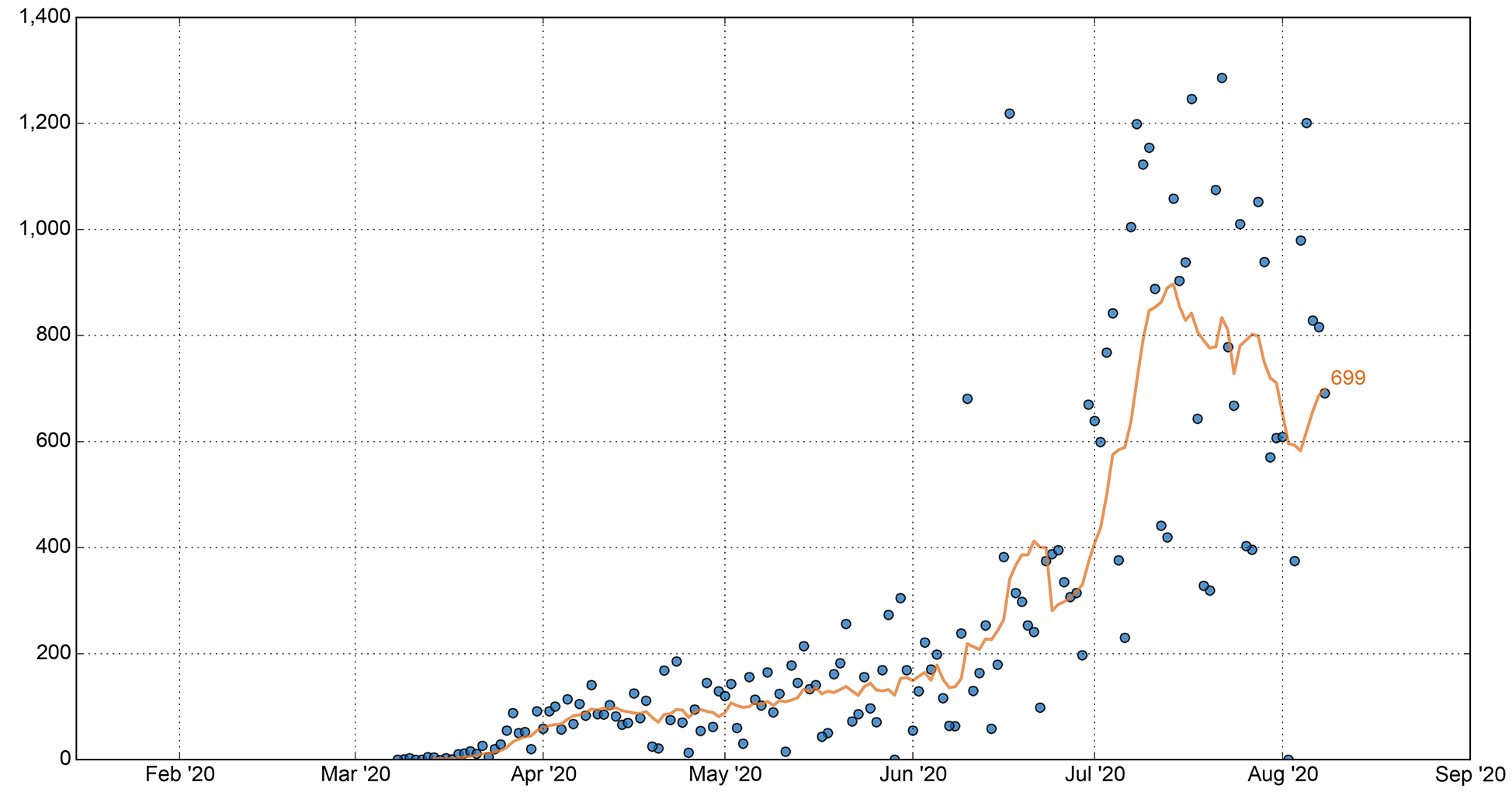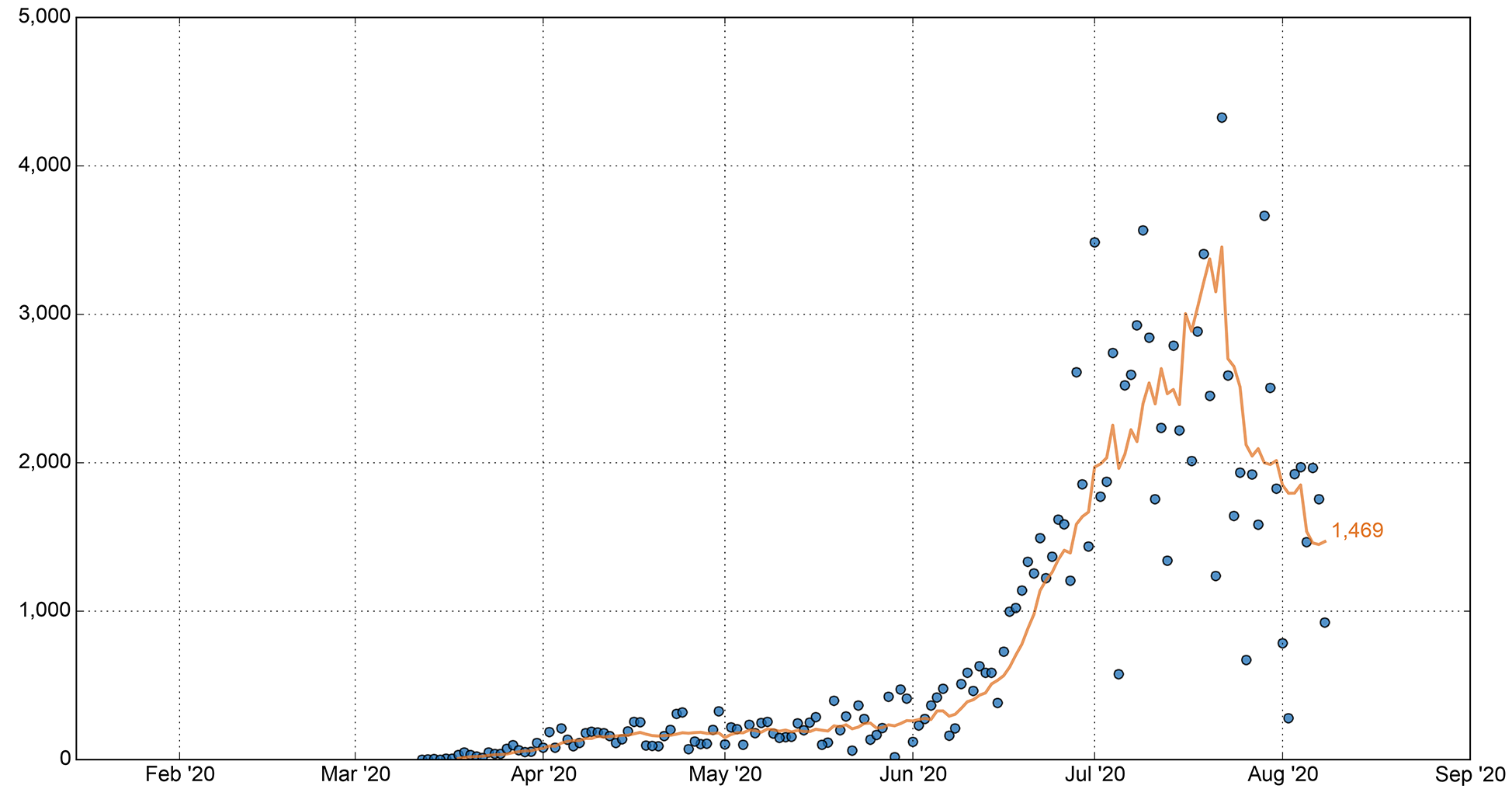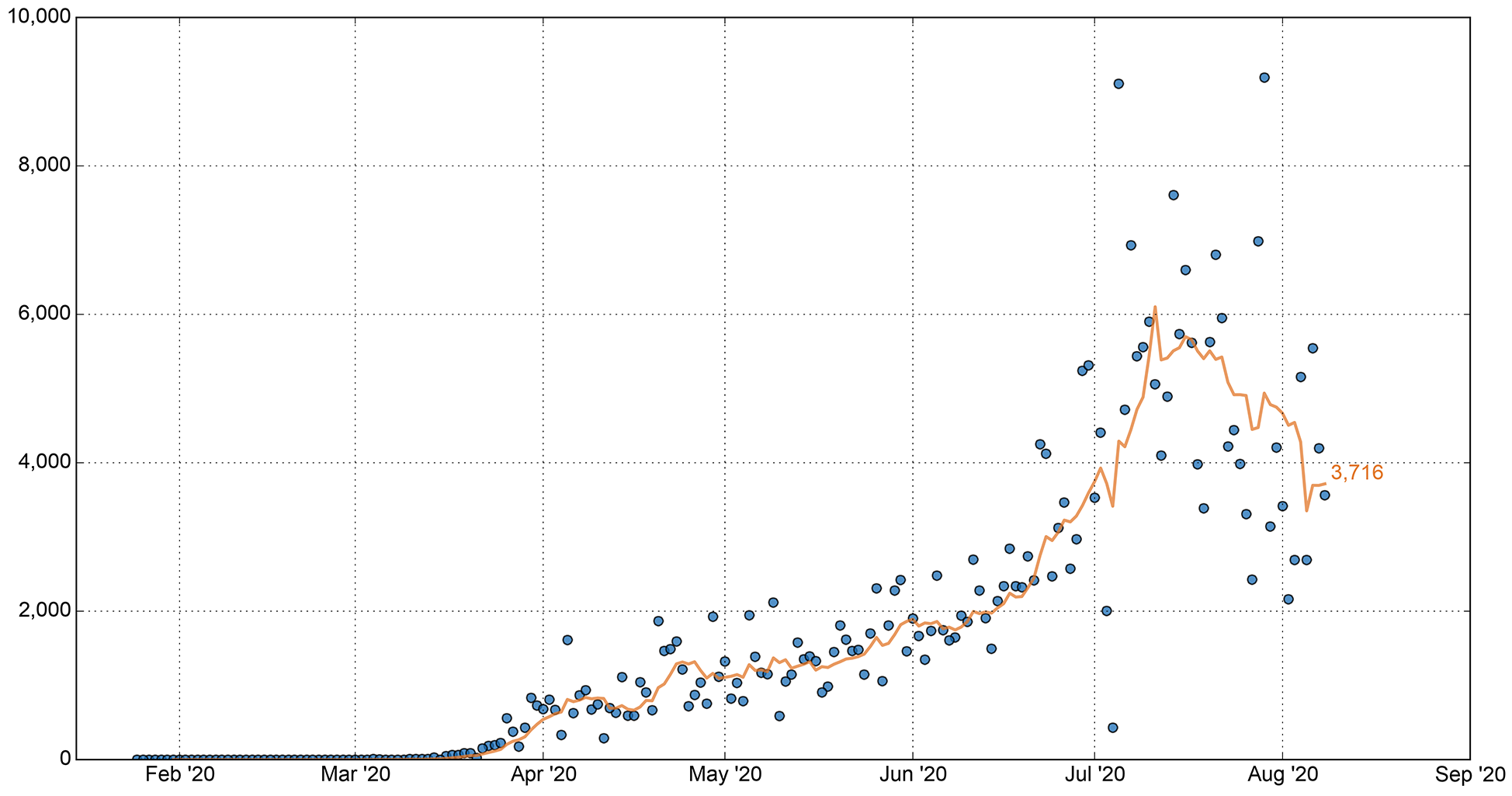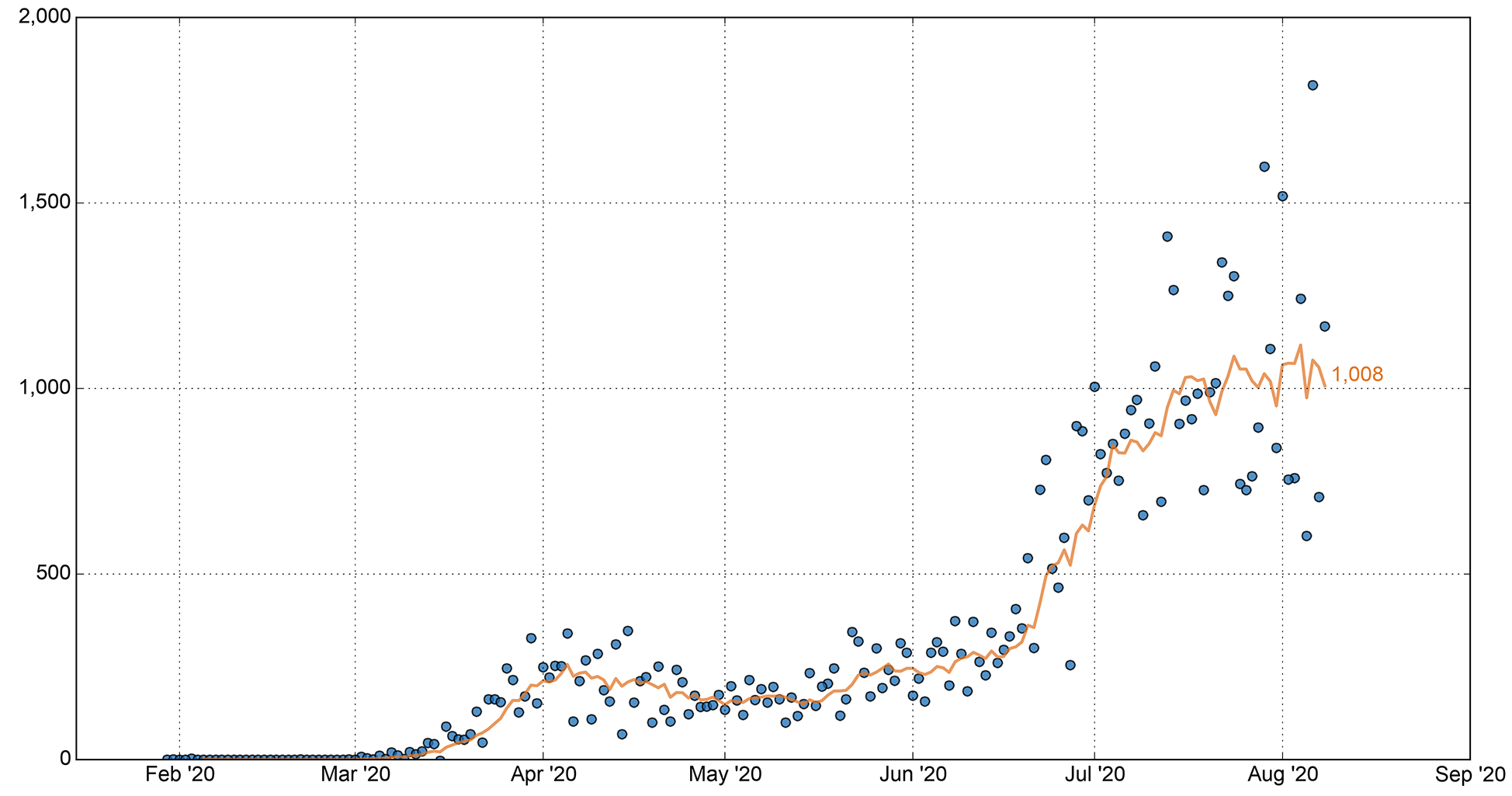As the COVID-19 Pandemic Rages On, Top Patent Venues Diverge on Jury Trials
The United States currently leads the world in confirmed COVID-19 cases. While those numbers are starting to trend back downward, the country saw a spike earlier in the summer as some states began to reopen their economies—and just as states responded differently from one another in the early days of the pandemic, current restrictions also vary widely in their severity. This same divergence extends to the courts, with judges from the nation’s top patent litigation venues differing sharply in their response to the pandemic and in the degree to which they have revisited safety measures in response to shifting COVID-19 case trends. Those differences are perhaps starkest with respect to jury trials: District Judge Rodney Gilstrap of the Eastern District of Texas has opted to forge ahead with in-person patent jury trials and began the country’s first such trial this past week, while other judges and venues have taken more cautious approaches. Here, RPX takes a look at how the top patent venues have responded to the pandemic, including an overview of district-specific COVID-19 case trends as well as disputes over the format and timing of trials.
The data on confirmed COVID-19 cases presented below are derived from an open API based on data compiled by Johns Hopkins University. The districts discussed here—the Eastern and Western Districts of Texas, the District of Delaware, and the Central and Northern Districts of California—were the top five districts for NPE litigation in Q2 2020 (and also appeared in the top five for litigation filed by all plaintiff types, minus the Northern District of California), but are sorted below in roughly descending order by the extent to which each venue has moved forward with jury trials.
For a ranking of these district by litigation filing levels, as well as details on related trends, see RPX’s second-quarter review.
The Eastern District of Texas
The Eastern District of Texas issued its first set of COVID-19 restrictions on March 16. That district-wide order imposed an initial continuance on all jury trials scheduled through May 1 but gave presiding judges the discretion to reset trial dates. The court’s order—which expired on May 31, and does not appear to have been renewed—came about two weeks before Texas Governor Greg Abbott imposed a state-wide stay-at-home order on April 2, which then expired on April 30 (making Texas among the first states to relax restrictions stemming from COVID-19). However, Governor Abbott began to roll back the state’s reopening plan on June 26, citing an increase in cases driven by certain indoor activities allowed under the previously relaxed restrictions.
Data on COVID-19 cases in the Eastern District show that confirmed infections remained relatively low through the period when the state’s stay-at-home order remained in place. Cases began to swing upward in June and peaked in the second week of July, about three weeks after the governor curtailed some of the state’s reopening plan. Numbers have since decreased somewhat as of early August.
The Eastern District of Texas: Daily Confirmed COVID-19 Cases and Seven-Day Moving Average

Note: Daily case counts are shown as blue dots, while the orange line shows the seven-day moving average. Data through August 8, 2020.
However, courts and litigants have differed over the extent to which the district-wide numbers—as opposed to the statistics for divisions including more rural areas—should determine whether to hold in-person jury trials, given the likely participation of attorneys and party witnesses from out-of-state.
Judge Gilstrap Forges Ahead
Significantly, District Judge Rodney Gilstrap has conveyed a desire to proceed with jury trials, telling Law360 as recently as late June (notably, around the same time that Governor Abbott reimposed restrictions) that while metropolitan areas of Texas have been harder hit by the novel coronavirus, his more rural Marshall Division has been less affected: “Texas is a large and diverse state, and while we are attempting to follow the public health guidance from the CDC [Centers for Disease Control and Prevention], the state and the Administrative Office of the US Courts, our circumstances have not forced us (at this time) to substantially curtail addressing the Constitutional mandate we have of providing justice within our district.”
Indeed, Judge Gilstrap has followed through on these statements. On Monday, August 3, he launched the nation’s first patent jury trial to be conducted since the start of the pandemic, held in a lawsuit filed by five subsidiaries of PanOptis Holdings, LLC against Apple over patents declared essential to the LTE standard (2:19-cv-00066).
Judge Gilstrap proceeded over Apple’s objection: on July 15, the company filed a motion to continue the trial until October 5 due to the risk posed by the pandemic to the parties and surrounding community. This danger, the company argued, was reflected in the increase in COVID-19 cases reported in the six counties that make up the Marshall Division, in Texas’s metropolitan areas, and the country in general, noting that “[t]he current number of new and active cases and the rate of increase in new and active cases far exceed the numbers on the date the Eastern District of Texas continued all jury trials on March 16, 2020 and when the Court extended the continuance on April 22, 2020”. Apple also cited risk statistics generated by Georgia Tech’s “COVID-19 Event Risk Assessment Planning Tool” showing that in Harrison County, where the Marshall Division sits, gatherings of 100 people (as would likely be present on the first day of trial) would present more than a 90% risk that at least one person in attendance would be infected with coronavirus.
Apple further warned that mask-wearing, regular disinfection, and social distancing may not be enough to prevent the spread of the virus (citing reports of a recent outbreak at a summer camp that had followed safety guidelines). The company also observed that a jury trial was “precisely” the sort of large, in-person gathering discouraged by the governor’s most recent orders and by CDC guidance identifying such gatherings as falling in a “highest risk” category. Additionally, Apple cited the prejudice that would result from multiple witnesses based in Europe that would be unable to attend trial due to restrictions imposed by US President Donald J. Trump.
Judge Gilstrap denied the motion on July 21, pushing back against evidence submitted by Apple on COVID-19 risk. In particular, he highlighted a declaration filed by Apple from a doctor outlining the challenges in holding an in-person trial, finding that “[h]is opinions are not so much tied to this location as they seem to convey that no in-person jury trial should be undertaken—anywhere”. Judge Gilstrap stated that he “assumes [the doctor] does not know and has no way to know” when it would be safe to hold a trial based on the cited concerns, and that neither does the court. After recounting supporting arguments from PanOptis, including its assertion that Apple was trying to “indefinitely delay this case”, Judge Gilstrap then proceeded to assert that the court had taken sufficient precautions to conduct trial safely. These precautions include the circulation of instructions on compliance with CDC guidelines to potential jurors and counsel, as well as sanitation procedures and measures to ensure social distancing and mask-wearing. Furthermore, the court found that live video testimony would alleviate due process concerns and that any delay in holding a trial would end up being “lengthy”—placing “both sides in a posture of limbo where they would languish unduly without the vindication of a public trial or a final resolution”.
Judge Gilstrap concluded by noting that the court faced a difficult “conundrum of first impression” in having to weigh health concerns against the rights of the parties to resolve their dispute. However, he summarized his posture on the issue through a quote from the poet Robert Frost: “the best way out is always through”.
Spotlight on Judge Schroeder
As trial proceeds in the PanOptis case, a similar dilemma faces District Judge Robert W. Schroeder III, who is presiding over one of VirnetX Inc.’s cases against the same defendant (6:12-cv-00855) in the Tyler Division—in which a retrial on damages is currently scheduled for August 17. On July 29, Apple filed a motion for a three-month continuance of that trial as well, citing similar safety concerns as in the PanOptis litigation. The company notes that other Texas venues have not moved ahead with jury trials, noting that they have been systematically continued in the Western District of Texas, Texas state courts, and courts in Smith County due to rising infection rates; and that high positivity rates—which have “exceeded 10% every day since June 23” statewide—statistically demonstrate that there is currently “uncontrolled community spread of COVID-19”.
Apple further argues that the court should continue the VirnetX trial to allow time to consider whether the safety measures taken in the PanOptis trial were effective: “Because the precautionary measures in the [PanOptis] case are an issue of first impression with regard to public health, Apple proposes that this trial be continued so the Court and the parties can objectively assess whether the measures sufficiently protected the health and safety of trial participants”.
Apple’s motion was heard at the pretrial conference held on August 3, the minutes for which indicate that a ruling is not immediately forthcoming: “[The c]ourt will not have [a] ruling on [the] continuance motion in the next couple of days”.
The Western District of Texas
COVID-19 cases in the Western District of Texas have followed a similar trend to those in the Eastern District, albeit at a greater scale given the former’s higher population. Confirmed cases began to increase about a month after the state began to reopen and peaked just after the middle of July—subsequently declining to a somewhat greater extent than in the Eastern District in recent weeks.
The Western District of Texas: Daily Confirmed COVID-19 Cases and Seven-Day Moving Average

The Western District has pushed back jury trials in response to the pandemic: the most recent district-wide order addressing COVID-19, issued on August 6 by Chief Judge Orlando L. Garcia, continued all civil and criminal bench and jury trials set through September 30 to a date to be determined by the presiding judge. However, the order also noted that conditions differ among the divisions of the Western District, and explicitly gives the most senior district judge in each division the discretion to resume jury trials if they find it can be done safely: “If judges in a specific division determine jury trials can be safely conducted, the most senior district judge within the relevant division may enter an order making those findings and resuming jury trials for the division despite this order and with notice to the Chief Judge”. As Judge Albright is the Waco Division’s only district judge, he therefore has sole discretion to make this determination.
Unlike Judge Gilstrap, however, Judge Albright has adopted a more cautious approach, exercising his discretion to continue trials. For example, he has done so several times in a lawsuit filed in October 2018 by inventor-controlled MV3 Partners LLC against Roku (6:18-cv-00308). While in April Judge Albright denied the defendant’s initial request for a continuance of a trial set for June, he has since pushed back that trial three times: on May 13, he continued the trial to June 29; on June 15, he pushed the trial back again to August 3 (though suggesting, according to a docket entry, that the court “cannot guarantee that the pandemic will allow the trial to go forward then”); and on July 7, he once again delayed the trial until September 8, also citing the pandemic. In that last ruling, the court noted concerns from counsel that this was still too soon but opted to set the trial date nonetheless, with the “hope that we will be able to proceed at that time”.
Judge Albright was confirmed to the bench in September 2018 and has made no secret of his desire to attract more patent litigation to his district—in part by implementing changes designed to make the Western District a more attractive venue for such cases. The result has been a significant uptick in filings there, particularly since late 2019. However, despite those increasing numbers—and rules that, in part, set the goal of starting trial one year after the Markman hearing—Judge Albright has yet to conduct a patent trial. With the looming specter of the ongoing pandemic, it may be some time before that particular milestone gets crossed.
The District of Delaware
The District of Delaware has seen the most favorable COVID-19 trends of any of the top districts. In particular, the district is the only one of the top five not to see a significant spike in the summer. This may in part be due to the state’s early imposition of protective public health measures: Governor John Carney declared a state of emergency on March 12, one day after the state saw its first confirmed case, and closed schools that same week—later extending that order through the remainder of the school year. About ten days later, the governor then closed the state’s beaches and issued a stay-at-home order. On March 29, the governor issued an order requiring all travelers to the state to quarantine themselves for 14 days. After imposing a series of other restrictions, including a ban on short-term rentals, the state then began to reopen in early June. While the data show that daily cases stopped declining in the month after the reopening, followed by a bump in early July, numbers have remained well below their peak in late April.
The District of Delaware: Daily Confirmed COVID-19 Cases and Seven-Day Moving Average

With respect to court operations, the District of Delaware entered into the first phase of a multi-stage reopening plan on June 22, under which ““[i]t is expected that . . . no jury trials, criminal or civil, will occur, except (if at all) in extraordinary circumstances. Individual judges will continue to address continuance requests on a case-by-case basis”. In the wake of that order, courts considered moving forward with jury trials in at least two patent cases before nixing those plans in July, after the parties raised concerns over rising COVID-19 case numbers. One of those lawsuits (Sunoco Partners Marketing & Terminals v. Powder Springs Logistics) saw Delaware Chief District Judge Leonard Stark consider an “experimental” trial that would have included remote witness testimony and limitations on people in the courtroom. However, on July 17, Judge Stark continued all jury trials scheduled through August 31 in light of the ongoing pandemic.
The Central District of California
The Central District of California has been hit particularly hard by COVID-19. Indeed, the top four counties in the state by number of total cases are all located in the Central District: populous Los Angeles, which accounts for 37.1% of the state’s coronavirus caseload and has the most total cases of any US county; followed by Riverside, Orange, and San Bernardino. The district saw a relatively brief dip in cases per day after the March 22 state-wide shelter-in-place order, primarily around the second week in April, and has otherwise steadily increased for the most part. Early July saw the seven-day trailing average of daily cases exceed 6,000, though cases have since been trending downward.
The Central District of California: Daily Confirmed COVID-19 Cases and Seven-Day Moving Average

The Central District has not yet resumed conducting jury trials: the district’s first COVID-19 order suspended jury trials scheduled through June 1, and its most recent order states that such trials are suspended “[u]ntil further notice”. No exceptions are provided based on a judge’s discretion. However, like Delaware, the Central District has adopted a three-phase reopening plan, and it has been in stage two (“reopening courthouses for limited in-court hearings”) since June 22. The third stage, which will bring the “resumption of jury trials”, “will be implemented at a date to be determined”.
The Northern District of California
The Northern District of California has seen relatively lower numbers of confirmed infections. After rising somewhat up through early April, numbers went back down and did not trend upward again until mid-late May. That early downward trend, and the comparatively lower daily caseloads at present, may in part be the result of the relatively early imposition of public health restrictions within the district: for instance, the City of San Francisco declared an emergency on February 26, before its first confirmed case; and in early March, it issued public health warnings and banned most gatherings. Shortly thereafter, San Francisco County and five others (Alameda, Contra Costa, Marin, San Mateo, San Francisco, and Santa Clara) also imposed shelter-in-place orders and enacted the first school closures.
The Northern District of California: Daily Confirmed COVID-19 Cases and Seven-Day Moving Average

Similarly, the Northern District has maintained a fairly stringent posture against jury trials since the earlier days of the pandemic. The district’s first order imposing restrictions as a result of COVID-19, issued on March 16, established that “[n]o jury trial will be commenced before May 1, 2020”, with no exceptions for the discretion of the providing judge, and continued any scheduled trial dates. Under the most recently adopted version of that order, the prohibition on jury trials extends through September 30, although the district now allows for remote bench trials “in lieu of postponement”, as does the Central District.
The Bigger Picture: Patent Litigation Has Increased Despite the Pandemic
While jury trials may be largely halted in the top patent venues, apart from East Texas, RPX data indicate that NPE patent litigation is actually increasing. In mid-March, around the time a national state of emergency was declared, NPE litigation began swinging upward relative to the same time period in 2019, a trend that has since intensified. Indeed, NPE plaintiffs filed more patent litigation in Q2 2020 than they have in any second quarter since 2016. NPEs also filed 28.1% more litigation in the second quarter than they did in Q1 2020, which itself was the strongest first quarter NPEs have had since 2015.
This ongoing rise in NPE activity reflects what happened in the wake of the last major economic downturn. Data on the financial crisis of 2008-2009 reveal that the Great Recession was followed by an increase in NPE litigation, which was on an uptrend going into that period and continued to rise in the years immediately afterwards. Indeed, the 2008 recession appears to have served as a catalyst for operating companies to begin divesting patents to NPEs due to economic hardship and/or as a result of the M&A activity that typically follows an economic downturn. We may soon see another influx of operating company and university patents flow onto the open market for these same reasons—but this time, with a flood of nonrecourse capital (litigation funding) available for potential patent plaintiffs, including NPEs.